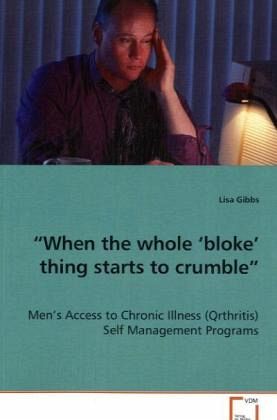
"When the whole 'bloke' thing starts to crumble"
Men's Access to Chronic Illness (Qrthritis) Self Management Programs
Versandkostenfrei!
Versandfertig in 6-10 Tagen
52,99 €
inkl. MwSt.

PAYBACK Punkte
26 °P sammeln!
Why are men under-represented as users of arthritisself management programs? This study explores theinteraction between gender, work, age and selfmanagement of a chronic illness from a socio-constructive perspective. A mixed method study wasconducted including analyses of service use records,in-depth interviews with men with arthritis andtheir partners, and a trial to test the applicationsof the research findings. It was found that men'sdecisions to access arthritis self managementprograms were strongly influenced by dominant socialexpectations of men to be strong and independent.This meant th...
Why are men under-represented as users of arthritisself management programs? This study explores theinteraction between gender, work, age and selfmanagement of a chronic illness from a socio-constructive perspective. A mixed method study wasconducted including analyses of service use records,in-depth interviews with men with arthritis andtheir partners, and a trial to test the applicationsof the research findings. It was found that men'sdecisions to access arthritis self managementprograms were strongly influenced by dominant socialexpectations of men to be strong and independent.This meant that they tended to avoid seeking helpuntil their condition deteriorated to a point ofcrisis, usually represented by an inability tocontinue working. This pattern of behaviour wasparticularly evident in men in the middle stages oflife with the greatest work and family obligations.More work needs to be done to explore the optionsfor reaching men before they arrive at a criticalstage in the progress of their condition. The rolesof general practitioners and partners need to betaken into account.












